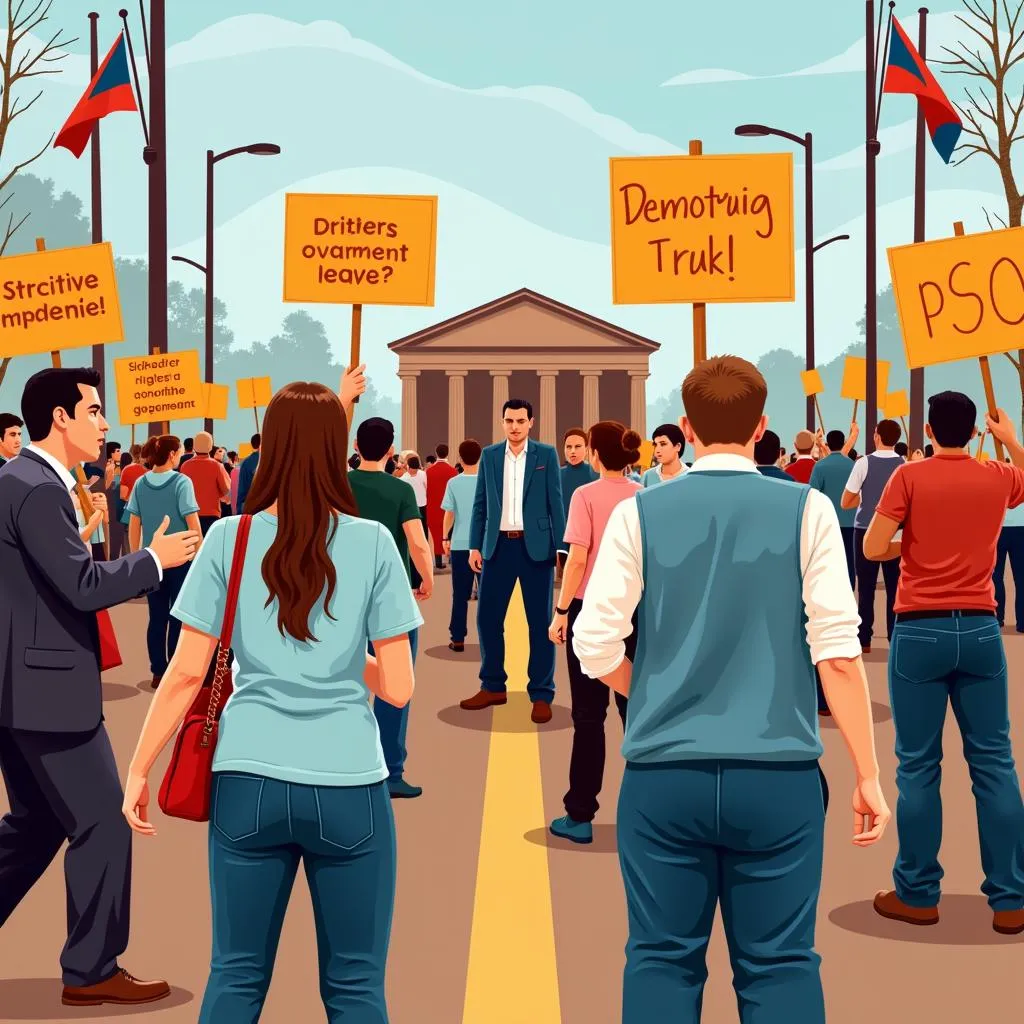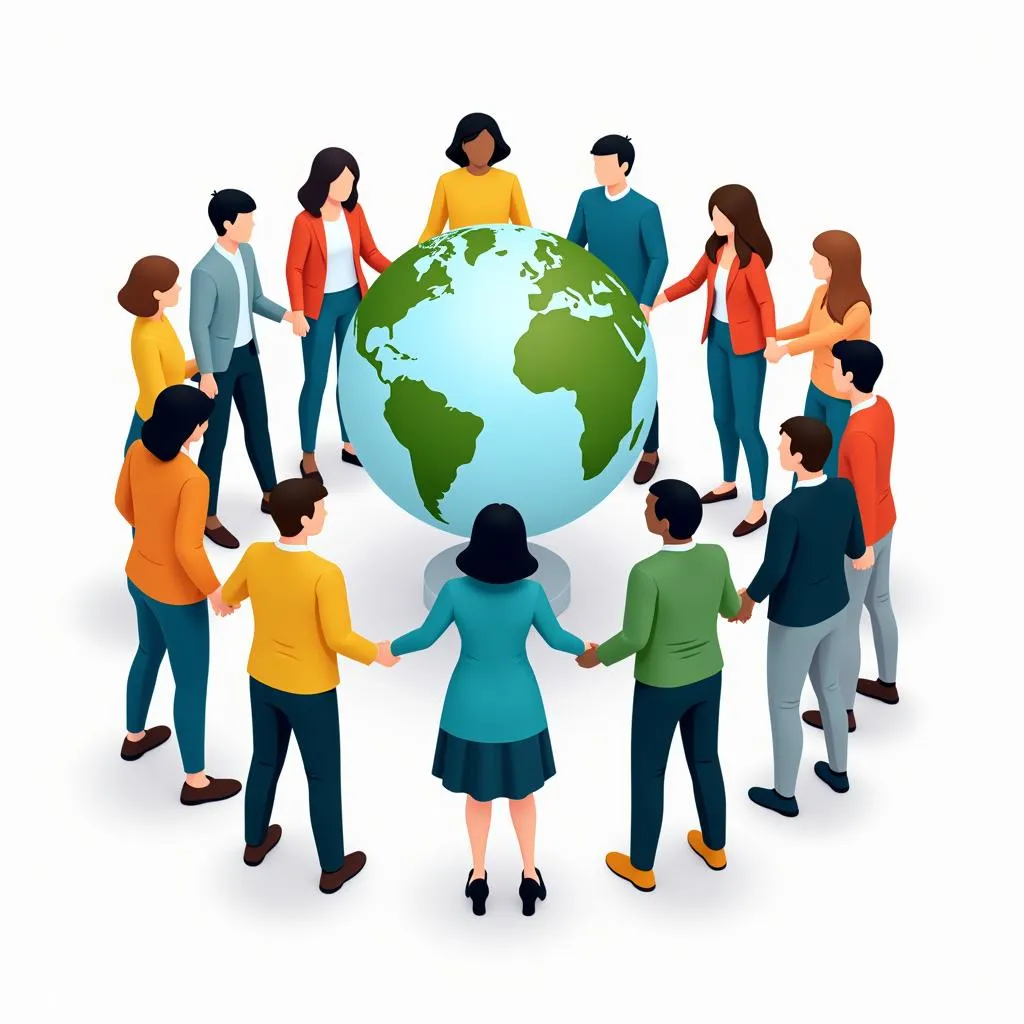The term “Civil Society Definition Ap Gov” often pops up when we discuss government and politics, but what does it truly mean? In essence, civil society refers to the realm of voluntary citizen associations that exist independently of the government. It’s the space where individuals come together based on shared interests, values, and goals to engage in collective action, advocate for their needs, and contribute to a well-functioning society. Think of it as the lifeblood of a thriving democracy, a vibrant tapestry of organizations, groups, and movements that enrich our communities and hold those in power accountable.
Delving Deeper: Exploring the Nuances of Civil Society
While the basic definition provides a starting point, understanding the complexities of civil society requires delving into its various facets and appreciating its multifaceted role.
What Constitutes Civil Society?
Civil society encompasses a wide spectrum of organizations, each with its unique focus and approach. From non-governmental organizations (NGOs) championing human rights to local community groups tackling neighborhood issues, the landscape of civil society is vast and diverse. Some key actors include:
- Non-governmental organizations (NGOs): These organizations often work on a larger scale, addressing issues like poverty, environmental protection, or international development.
- Community-based organizations (CBOs): These groups are rooted in specific localities, focusing on issues relevant to their immediate surroundings, such as improving local schools or advocating for safer streets.
- Trade unions and professional associations: These organizations represent the interests of workers and professionals in specific sectors, advocating for fair wages, safe working conditions, and professional development opportunities.
- Religious institutions: Churches, temples, mosques, and other religious organizations play a significant role in many societies, providing social services, promoting ethical values, and often advocating for social justice.
- Social movements: These are loosely organized groups that emerge around specific issues or causes, mobilizing public opinion and pushing for social or political change.
 Diverse Civil Society Organizations
Diverse Civil Society Organizations
The Crucial Role of Civil Society in a Democracy
A thriving civil society is not merely a feature of a healthy democracy; it is essential for its very existence and flourishes. Here’s why:
- Advocacy and Watchdog Role: Civil society organizations act as the voice of the people, holding the government accountable for its actions and advocating for policies that serve the public interest.
- Promoting Civic Engagement: By providing avenues for individuals to participate in civic life beyond elections, civil society fosters a sense of ownership and responsibility among citizens, strengthening democratic values and practices.
- Facilitating Dialogue and Consensus-building: In a diverse society, civil society organizations provide platforms for different groups to come together, exchange ideas, and find common ground on important issues.
- Service Delivery: Many civil society organizations fill gaps in service provision, particularly in areas like healthcare, education, and social welfare, where government resources may be limited.
 Civil Society Advocacy and Citizen Engagement
Civil Society Advocacy and Citizen Engagement
Challenges and Opportunities for Civil Society
Despite its importance, civil society often faces challenges that hinder its effectiveness. Restrictions on freedom of association, limited access to funding, and bureaucratic hurdles can all impede the work of civil society organizations.
However, the digital age presents new opportunities for civil society to connect, collaborate, and amplify its impact. Online platforms facilitate the formation of global networks, enabling organizations to share resources, coordinate campaigns, and mobilize support across borders.
The Importance of Understanding “Civil Society Definition AP Gov”
Why should you care about the definition of civil society, especially in the context of AP Government?
- Understanding Power Dynamics: Grasping the concept of civil society is crucial for analyzing the distribution of power within a political system and understanding how citizens can influence decision-making processes.
- Analyzing Political Systems: When studying different political systems, recognizing the role and influence of civil society provides a more nuanced and comprehensive understanding of their strengths and weaknesses.
- Becoming an Engaged Citizen: Learning about civil society can inspire you to become an active and engaged citizen, empowering you to participate in shaping your community and advocating for the issues you care about.
Conclusion: Embracing the Power of Collective Action
In conclusion, understanding “civil society definition AP Gov” is not just about memorizing a term for an exam; it’s about recognizing the transformative power of collective action. It’s about acknowledging the vital role that everyday citizens, united by shared values and aspirations, play in building a more just, equitable, and peaceful world. As you continue your exploration of government and politics, remember that true democracy thrives when citizens are empowered to raise their voices, engage in constructive dialogue, and hold their leaders accountable.
 Global Civil Society for a Peaceful World
Global Civil Society for a Peaceful World
Frequently Asked Questions (FAQs)
-
What is the difference between civil society and the government?
Civil society operates independently of the government. While the government holds formal power to make and enforce laws, civil society represents the collective interests and values of citizens, advocating for their needs and holding the government accountable. -
Can individuals be part of multiple civil society organizations?
Absolutely! In fact, many individuals are active in several organizations that align with their interests and values, showcasing the dynamic and interconnected nature of civil society. -
How can I get involved in civil society?
There are countless ways to get involved! You can volunteer your time, donate to a cause you care about, join a local community group, or even start your own initiative. -
What are some examples of successful civil society movements?
History is replete with examples of successful civil society movements, such as the Civil Rights Movement in the United States, the anti-apartheid struggle in South Africa, and the movement for women’s suffrage. -
What is the role of technology in empowering civil society?
Technology has revolutionized how civil society organizations operate, enabling them to connect with a broader audience, mobilize support, and advocate for change more effectively. Social media platforms, online fundraising tools, and digital advocacy campaigns have become indispensable for many organizations.
Need Help? Contact Us!
For further assistance and information on how you can contribute to a more peaceful world, please don’t hesitate to contact us.
Phone Number: 02043854663
Email: [email protected]
Address: Khu 34, Bắc Giang, 260000, Vietnam.
Our dedicated customer support team is available 24/7 to assist you.